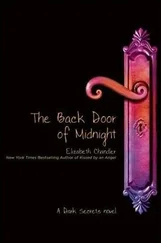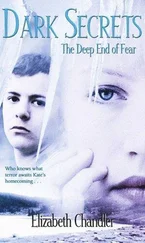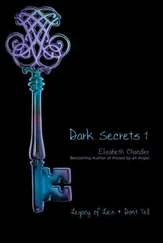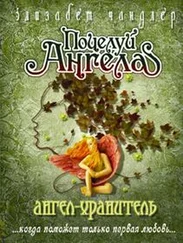Элизабет Чандлер - Don't Tell
Здесь есть возможность читать онлайн «Элизабет Чандлер - Don't Tell» весь текст электронной книги совершенно бесплатно (целиком полную версию без сокращений). В некоторых случаях можно слушать аудио, скачать через торрент в формате fb2 и присутствует краткое содержание. Жанр: Фэнтези, на английском языке. Описание произведения, (предисловие) а так же отзывы посетителей доступны на портале библиотеки ЛибКат.
- Название:Don't Tell
- Автор:
- Жанр:
- Год:неизвестен
- ISBN:нет данных
- Рейтинг книги:4 / 5. Голосов: 1
-
Избранное:Добавить в избранное
- Отзывы:
-
Ваша оценка:
- 80
- 1
- 2
- 3
- 4
- 5
Don't Tell: краткое содержание, описание и аннотация
Предлагаем к чтению аннотацию, описание, краткое содержание или предисловие (зависит от того, что написал сам автор книги «Don't Tell»). Если вы не нашли необходимую информацию о книге — напишите в комментариях, мы постараемся отыскать её.
Don't Tell — читать онлайн бесплатно полную книгу (весь текст) целиком
Ниже представлен текст книги, разбитый по страницам. Система сохранения места последней прочитанной страницы, позволяет с удобством читать онлайн бесплатно книгу «Don't Tell», без необходимости каждый раз заново искать на чём Вы остановились. Поставьте закладку, и сможете в любой момент перейти на страницу, на которой закончили чтение.
Интервал:
Закладка:
Stranger yet, despite the breeze that night, the blades were absolutely still. When I shone the flashlight on the fan, I saw that the flap behind it had been closed, which was done only in winter to seal out the cold air. I tried the smaller fans distributed along the plant benches. They didn’t work, nor did the center light.
It must be the power supply, I thought, and searched for a metal cabinet containing a circuit breaker. I found an ancient box with two screw-in fuses. Both had been removed.
Still something was running — I could hear the quiet motors. Space heaters, that’s what was making it hot The heaters burned kerosene and were used in the winter to keep the plants warm. I found four of them in the side aisles of the greenhouse and turned them off, puzzled as to why Nora or anyone else would have them running.
There was little I could do to save the plants except open the door and hope some cool air would waft in. I decided to transport at least one of each kind outside and carried a heavy pot to the entrance.
When I tried to open the door, it wouldn’t budge. I set down the plant and shone the flashlight on the lock. The door had a deadbolt, the kind that required a key and could be locked from inside or out. But I hadn’t locked it and the key kept on the hook next to the door was gone. Someone had taken it and turned the bolt from the outside. I couldn’t believe it — I had walked straight into a trap!
Nora’s trap. She must have been nearby, waiting until I was at the other end of the greenhouse to lock the door. But she was supposed to have been with Aunt Jule. Again I considered the possibility of another person being responsible for my mother’s death and the things that had been happening to me. Nora’s crazy behavior would provide a convenient cover, and it would be easy enough to mimic her. Who knew about the boathouse incident? Nick and Frank, Holly and Aunt Jule — and anyone in the town whom they might have told.
I tried to illuminate the area beyond the door, but the flashlight’s reflection off the glass surface made it impossible to see more than a foot beyond the greenhouse.
I clicked it off and stepped back from the door, retreating farther and farther into the rows of plants, hoping that as I became less visible, I would detect some movement outside.
Something touched my neck. I pulled away from a bench of plants and clumsily banged into the one across from it. It was my own sweat trickling down, nothing else. The heat was oppressive. A dull headache throbbed behind my eyes.
I wanted to sleep.
The obvious way to escape was to break the glass, but I was reluctant to. The large square panes were old and might be irreplacable. I decided to rest there till Holly or Aunt Jule woke up and found me. I sat on the damp brick floor, longing to put my head down, but something kept nagging at me. The missing fuses, the sealed fan. I pulled myself to my feet again and waves of dizziness broke over me. I felt sick, as if I had inhaled fumes, but I could smell nothing but the rich earthiness of the greenhouse.
Lack of ventilation, space heaters, sleepiness, no smellmy muddled mind kept groping for the pattern it sensed but couldn’t identify. Sleepiness, no smell — carbon monoxide!
The gas could be generated by heating units. It was odorless. And it could kill.
I had to break a window. I remembered that there was a hand shovel by the trellises, but I was closer to the front of the greenhouse, and the path to the back seemed long to me now, wavering in front of my eyes like a distant patch of road on a hot day. The flashlight, that would work.
I had left it on the ground when I’d sat down. I leaned over to pick it up and pitched forward. It took all of my strength to straighten up. I discovered I couldn’t look down — just moving my head made me dizzy. Crouching slowly, grasping the end of a plant bench with one hand, I felt with my other for the flashlight.
My fingers curled around its plastic barrel. I pulled myself up and moved uncertainly toward the front of the greenhouse, like an old woman feeling her way along the pews of a church. The open area by the entrance would allow me to take aim at the glass from a safe distance.
I stopped where the benches ended, about six feet from the front wall, and hurled the flashlight toward a pane. But my body had become as sloppy as my mind from the poisonous gas. The flashlight glanced off the metal frame without making a crack in the glass.
Unable to walk without support, I got down on my knees and crawled to the flashlight. I knew I’d get cut, smashing the glass at close range; the best I could do was turn my face away. Kneeling close to the window, holding the flashlight like a hammer, I banged against the glass relentlessly.
Shards fell like a shower of prickly leaves, stinging my arms. I knocked the two-foot square out cleanly, then dropped the flashlight on the grass. Standing up, thrusting my head through the opening, I gulped my first breath of fresh air and felt the cold breeze on my sweaty skin. Then I blacked out.
“Lauren? Lauren?”
I opened my eyes and quickly shut them again, drawing back from the bright light shining in my face. It clicked off.
“Lauren, can you hear me?” Nick asked.
A long dog tongue licked my face. Reaching up, I put my arms around Rocky and sat up slowly. I felt sick and scared.
I wished Nick would hold me and be as gentle as he was with Nora, but I wouldn’t ask for his comfort. I buried my face in the dog’s fur.
“Your arms are cut,” Nick said. “I want to check them.”
Without looking at him, I held out one, then the other, and felt him probing the skin.
“Nothing deep,” he told me, “mostly scratches. Still, you should soak in a tub to make sure all the glass is out,” he added, his voice sounding almost clinical. “What happened? Why did you break the window?”
“Someone was trying to kill me.”
“What?”
I petted Rocky until I felt in control. “I was out walking,” I said, “and saw a light on in the greenhouse, the flashlight you’re holding. I went inside. It was hot and stuffy. I couldn’t ventilate the place. The fuses were pulled, the fan sealed, the vent crank broken. Space heaters had been left on.
When I tried to leave, I found the door locked, locked from the outside.”
I gazed up at Nick’s face, waiting to see the flicker of realization. Behind him, the house lights came on. Nick glanced over his shoulder, then back at me.
“Don’t you understand?” I said, but I could see by his face that he didn’t. He wouldn’t allow himself to believe that someone in Wisteria was a murderer.
“Understand what?”
“Nick, someone tried to kill me — to poison me with carbon monoxide!”
Another light went on downstairs, and three figures came out on the porch.
“What’s going on?” Holly shouted to us. “Is everything all right?”
“Fine,” Nick called back to her.
Fine, I thought wryly. Aloud I asked, “Why are you here, Nick? Did they call you?”
“Someone did,” he said.
“Nick, is Lauren out there?” Holly asked. “She’s not in her room.”
“She’s here, she’s fine,” Nick replied. In a quieter voice he said to me, “After I got home someone telephoned my house three times and hung up. The Caller ID listed Jule’s number. I thought Nora might be upset and trying to reach me.”
“She was upset,” I told him, “and sleeping in Aunt Jule’s room tonight — at least, she was supposed to be.” I saw Holly hurrying toward us, followed by Aunt Jule and Nora.
“So why did you come to the greenhouse?”
He hesitated. “It made sense to check here first. Nora spends a lot of time here.”
Читать дальшеИнтервал:
Закладка:
Похожие книги на «Don't Tell»
Представляем Вашему вниманию похожие книги на «Don't Tell» списком для выбора. Мы отобрали схожую по названию и смыслу литературу в надежде предоставить читателям больше вариантов отыскать новые, интересные, ещё непрочитанные произведения.
Обсуждение, отзывы о книге «Don't Tell» и просто собственные мнения читателей. Оставьте ваши комментарии, напишите, что Вы думаете о произведении, его смысле или главных героях. Укажите что конкретно понравилось, а что нет, и почему Вы так считаете.












